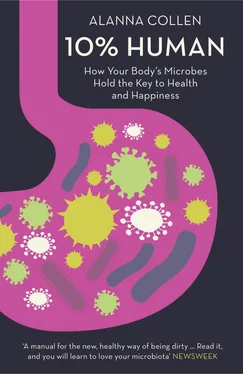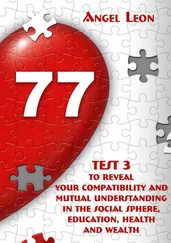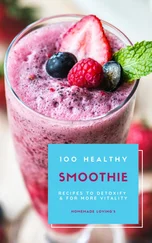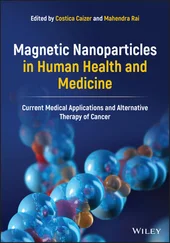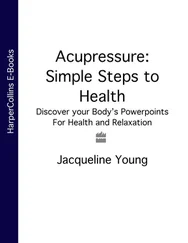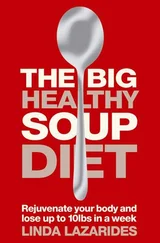But, unexpectedly, the story did not end there. I was cured, but not just of the tick-borne infection. Instead, it seemed I had been cured as if I were a piece of meat. The antibiotics had worked their magic, but I began to suffer new symptoms, as varied as before. My skin was raw, my digestive system was choosy, and I was prone to picking up every infection going. I had a suspicion that the antibiotics I had taken had not only eradicated the bacteria that plagued me, but also those that belonged in me. I felt like I had become inhospitable to microbes, and I learnt just how much I needed the 100 trillion friendly little creatures who had, until recently, called my body their home.
You are just 10 per cent human.
For every one of the cells that make up the vessel that you call your body, there are nine impostor cells hitching a ride. You are not just flesh and blood, muscle and bone, brain and skin, but also bacteria and fungi. You are more ‘them’ than you are ‘you’. Your gut alone hosts 100 trillion of them, like a coral reef growing on the rugged seabed that is your intestine. Around 4,000 different species carve out their own little niches, nestled among folds that give your 1.5-metres-long colon the surface area of a double bed. Over your lifetime, you will play host to bugs the equivalent weight of five African elephants. Your skin is crawling with them. There are more on your fingertip than there are people in Britain.
Disgusting, isn’t it? We are surely too sophisticated, too hygienic, too evolved to be colonised in this way. Shouldn’t we have shunned microbes, like we did fur and tails, when we left the forests? Doesn’t modern medicine have the tools to help us evict them so that we can live cleaner, more healthy, independent lives? Since the body’s microbial habitat was first discovered we have tolerated it, as it seemed to do us no harm. But unlike the coral reefs, or the rainforests, we have not thought to protect it, let alone to cherish it.
As an evolutionary biologist, I am trained to look for the advantage, the meaning , in the anatomy and behaviour of an organism. Usually, characteristics and interactions that are truly detrimental are either fought against, or lost in evolutionary time. That set me thinking: our 100 trillion microbes could not call us home if they brought nothing to the party. Our immune systems fight off germs and cure us of infections, so why would they tolerate being invaded in this way? Having subjected my own invaders, both good and bad, to months of chemical warfare, I wanted to know more about the collateral damage I had caused.
As it turned out, I was asking this question at exactly the right time. After decades of slow-paced scientific attempts at learning more about the body’s microbes by culturing them on Petri dishes, technology had finally caught up with our curiosity. Most of the microbes living inside us die when they are exposed to oxygen, because they are adapted to an oxygen-free existence deep in our guts. Growing them outside the body is difficult, and experimenting with them is even harder.
But, in the wake of the seminal Human Genome Project, in which every human gene was decoded, scientists are now capable of sequencing massive quantities of DNA extremely quickly and cheaply. Even our dead microbes, expelled from the body in the stool, could now be identified because their DNA remained intact. We had thought our microbes didn’t matter, but science is beginning to reveal a different story. A story in which our lives are intertwined with those of our hitchhikers, where our microbes run our bodies, and becoming a healthy human is impossible without them.
My own health troubles were the tip of the iceberg. I learnt of the emerging scientific evidence that disruptions to the body’s microbes were behind gastrointestinal disorders, allergies, autoimmune diseases, and even obesity. And it wasn’t just physical health that could be affected, but mental health as well, from anxiety and depression to obsessive–compulsive disorder (OCD) and autism. Many of the illnesses we accept as part of life were not, it seemed, down to flaws in our genes, or our bodies letting us down, but were instead newly emerging conditions brought on by our failure to cherish the long-held extension to our own human cells: our microbes.
Through my research, I hoped not only to discover what damage the antibiotics I had taken had done to my microbial colony, but how it had made me unwell, and what I could do to restore the balance of microbes I had harboured before the night of the tick bites, eight years earlier. To learn more, I signed up to take the ultimate step in self-discovery: DNA sequencing. But rather than sequence my own genes, I would have the genes of my personal colony of microbes – my microbiome – sequenced. By knowing which species and strains of bacteria I contained, I would have a starting point for self-improvement. Using the latest understanding of what should be living in me, I might be able to judge just how much damage I had done, and attempt to make amends. I used a citizen-science programme, the American Gut Project, based at the laboratory of Professor Rob Knight at the University of Colorado, Boulder. Available to anyone around the world for a donation, the AGP sequences samples of microbes from the human body to learn more about the species we harbour and their impact on our health. By sending a stool sample containing the microbes from my own gut, I received a snapshot of the ecosystem that called my body home.
After years of antibiotics, I was relieved to find I had any bacteria living in me at all. It was pleasing to see that the groups I harboured were at least broadly similar to those in other American Gut Project participants, and not the microbial equivalent of mutant creatures eking out a living on a toxic wasteland. But, perhaps predictably, the diversity of my bacteria seemed to have taken a beating. At the highest level of the taxonomic hierarchy, the diversity was relatively low, looking a bit bipartisan compared with the guts of other people. Over 97 per cent of my bacteria belonged to the two major bacterial groups, compared with around 90 per cent making up these two groups in the average participant. Perhaps the antibiotics I had taken had killed off some of the less abundant species, leaving me with only the hardy survivors. I was intrigued to know whether this loss might be related to any of my more recent health troubles.
But, just as comparing a tropical rainforest and an oak woodland by looking at the proportion of trees to shrubs, or birds to mammals, reveals little about how both ecosystems function, comparing my bacteria at such a broad scale may not tell me all that much about the health of my inner community. At the other end of the taxonomic hierarchy were the genera and species that I contained. What could the identities of the bacteria that had either clung on throughout my treatment, or returned since it ended, reveal about my current state of health? Or perhaps more pertinently, what did the absence of species that might have fallen victim to the chemical warfare I had unleashed on them, mean for me now?
As I embarked on learning more about us – myself and my microbes – I resolved to put what I learnt into practice. I wanted to get back on their good side, and I knew I needed to make changes to my life to restore a colony that would work in harmony with my human cells. If my most recent symptoms were stemming from the collateral damage I had inadvertently inflicted upon my microbiota, perhaps I could reverse it and rid myself of the allergies, the skin problems and the near-constant infections? My concern wasn’t just for myself, but for the children I hoped to have in the coming years. As I would pass on not only my genes, but also my microbes, I wanted to be sure I had something worth giving.
Читать дальше
